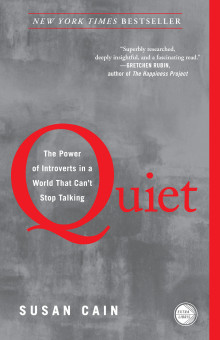Meeting Monday, December 18 from 6:30 pm – 8:00 pm. at Nabeel’s Cafe. Come join us for food and fun while we discuss the title for December – Quiet by Susan Cain.
 What do the following people have in common: Albert Einstein, Warren Buffett, Frederic Chopin, J.K. Rowling, Larry Page, Eleanor Roosevelt, Isaac Newton, and Steven Spielberg? Besides being famous, they are all introverts.
What do the following people have in common: Albert Einstein, Warren Buffett, Frederic Chopin, J.K. Rowling, Larry Page, Eleanor Roosevelt, Isaac Newton, and Steven Spielberg? Besides being famous, they are all introverts.
Introvert/Extrovert. Is there really that big of a difference between the two? It seems as though this might be true. In a world where “everyone knows your name”, having a “squad” is the new status symbol and being “loud and proud” is the norm, is there a place in this social-centric world for those who just wanna find a quiet place and just “be”…. alone?
New York Times best-selling author Susan Cain looks at this topic in-depth. Cain is an honors graduate of Princeton and Harvard. She found her passion in learning more about introverts and what makes them tick. After a long period of research and interviews, she wrote her first book. Not very comfortable with public speaking, she enrolled in Toastmasters, which led her to her first TED talk, which has been viewed over 17 million times and was named by Bill Gates one of his all-time favorite talks.
Her books have been translated in over 40 different languages, has been on the New York Times bestseller list for almost three years, and was named the #1 best book of the year by Fast Company magazine, which also named Cain one of its Most Creative People in Business. Cain is also the co-founder of the Quiet Schools Network and the Quiet Leadership Institute. Her writing has appeared in the The New York Times, The Atlantic, The Wall Street Journal, and many other publications. Cain is also the co-founder of the Quiet Schools Network and the Quiet Leadership Institute.
 Passionately argued, impressively researched, and filled with indelible stories of real people, Susan Cain’s Quiet: The Power of Introverts in a World That Can’t Stop Talking shows how dramatically we undervalue introverts and how much we lose in doing so. Taking the reader on a journey from Dale Carnegie’s birthplace to Harvard Business School and from a Tony Robbins seminar to an evangelical mega church, Cain charts the rise of the Extrovert Ideal in the twentieth century and explores its far-reaching effects.
Passionately argued, impressively researched, and filled with indelible stories of real people, Susan Cain’s Quiet: The Power of Introverts in a World That Can’t Stop Talking shows how dramatically we undervalue introverts and how much we lose in doing so. Taking the reader on a journey from Dale Carnegie’s birthplace to Harvard Business School and from a Tony Robbins seminar to an evangelical mega church, Cain charts the rise of the Extrovert Ideal in the twentieth century and explores its far-reaching effects.
She talks to Asian-American students who feel alienated from the brash, back slapping atmosphere of American schools. She questions the dominant values of American business culture, where forced collaboration can stand in the way of innovation and where the leadership potential of introverts is often overlooked. And she draws on cutting-edge research in psychology and neuroscience to reveal the surprising differences between extroverts and introverts.
Perhaps the most inspiring part of the book is where Cain introduces us to successful introverts such as a witty, high-octane public speaker who recharges in solitude after his talks or a record-breaking salesman who quietly taps into the power of questions.
Finally, she offers invaluable advice on everything from how to better negotiate differences in introvert-extrovert relationships and empower an introverted child to when it makes sense to be a “pretend extrovert.” This extraordinary book has the power to permanently change how we see introverts and, equally important, how introverts see themselves.
